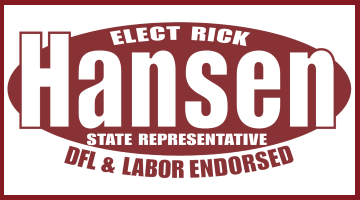Colleague Endorsements
From U.S. Senator Tina Smith:
Rick Hansen is a respected leader in the Legislature on prioritizing clean water, protecting pollinators and preventing the spread of aquatic invasive species. We need a champion for the environment at the Minnesota Capitol, and I encourage you to reelect Rick on November 8.
From Rep. Kelly Morrison:
I am grateful for Representative Hansen’s leadership and mentorship. I have had the honor to serve on the Environment and Natural Resources Committee with him for the past four years, and have witnessed firsthand his excellent leadership as the Chair of that committee. Chair Hansen is an inclusive and collaborative leader who ensures that all voices are heard both within the DFL caucus and among our DFL and GOP colleagues who sit on the committee.
In the era of accelerating climate change and increasing threats to Minnesota’s environment, Rick Hansen’s experience, expertise and leadership are needed now more than ever in the legislature.
From John Kaul:
Rick Hansen is proof that one person can make a difference in this world and that is something he has fervently believed since his early days working for important causes.
In every legislative session I have witnessed during the last half century there have always been a handful of members who truly master the process well enough to make big things happen. It’s not just knowing parliamentary procedure that brings warring factions together around a compromise on a major bill. If you can’t read the audience, if you don’t understand the importance of relationships, if you’re a purist or an ideologue who doesn’t know how to compromise, if you don’t understand the importance of timing, or you can’t read body language you will not leave your mark on history. It's a “Here’s yours, where’s mine” world – or at least it was during those bygone days when the legislature felt compelled to finish its work. My former boss and mentor, Sen. Nick Coleman, a man who demonstrated great mastery over the process, especially when he served as majority leader from 1973 to 1981, warned of those “bad barometer days,” when the atmospheric pressure is so low that everyone is out of sorts.
Rick Hansen is a legislator who gets all of that. He’s been around since the 2005 session and has mastered the process. I admire him for that and because he is the most ardent environmentalist at the Minnesota Capitol.
Rick had a mentor just as I did. His was Democratic Rep. Henry Kalis who represented a bunch of counties along the Iowa border in South Central Minnesota from 1975 to 2001. Henry is most remembered as the guy who showed up at the Secretary of State’s office the day before the filing date like clockwork every two years and camped there overnight so he could be the first to file. He was also a very ethical fiscal conservative who for a time chaired the House Bonding Committee - a committee which borrows hundreds of millions in dollars to build and maintain state buildings, roads and bridges. I once presented him with a sign that read, “Neither A Lender nor Borrower Be,” the irony of which pleased him greatly. Rick Hansen cut his teeth working on Henry Kalis’ campaigns and once kept him company during his vigil to be the first to file.
Hansen is a product of that same part of the state as Kalis. His interest in environmental issues owes to his early involvement in the Future Farmers of America (FFA). His FFA project dealt with the dangers of pesticides, and this is a crusade he carries on today. He was also involved in Project 120, which was a program designed to get youth knowledgeable and interested in government service. He told me that it was a thrill for a kid from a very small town to spend a week in St. Paul at the former Kelly Inn learning about every phase of state government.
He attended college at Iowa State, where he got his Masters in Soil Management; his undergrad interests included theater, journalism and science courses. He was president of the Young Democrats as a student there. Because he was a student in Iowa, he was able to take part in that state’s presidential primary in 1988. There he met and rubbed shoulders with all the Democratic seekers of the presidency that year. Four years later he attended Bill Clinton’s Inauguration.
One special benefit of all his campaign work was a special invite to the White House toward the end of Clinton’s presidency. Bill Clinton is a serious collector of campaign memorabilia and so is Rick Hansen. Rick was invited, along with about ten other collectors, for a visit with the President to discuss their collections.
When he moved to the Twin Cities after college, he stayed involved in local politics becoming the Senate District chair for the area around South St. Paul. He then ran and won a seat on the Soil and Water Conservation District becoming its chair in 2000. When Rep. Tom Pugh stepped down in 2004, because of an appointment to the Public Service Commission by Gov. Pawlenty, Pugh encouraged Hansen to run for his soon to be vacant House seat. The rest is history.
As a craftsman, Hansen believes that bills need to be perfected as they move through the process. That is why process is so important in a legislature. A bill need not be perfect from the start. As it moves through the process members committed to good laws make suggestions that often improve a bill based on experiences they have had in their various professions and associations. So do lobbyists, believe it or not – not always, but often. When a committee member attaches an amendment to your bill, they start to feel a degree of ownership in a piece of legislation and may support it as it moves through the committee process and when it gets to the floor. He believes legislators should be able to effectively present and defend a bill when it comes up in a committee.
What is deeply troubling to Rick is the slow but steady erosion of the legislative process in recent times. When he first arrived at the legislature most members presented and defended their own bills before a committee. Their witnesses sat in the audience in the event their expertise was needed. Then, as time went by, having a legislator present the bill with a lobbyist or a person from the state agency at the table became the norm. Today, too often Hansen says, many legislators act more as a master of ceremonies, introducing their bill and then handing the explanation, sales work and defense of the bill’s provisions over to the experts.
Another development that former Majority Leader Roger Moe says should concern Minnesotans is the practice, for far more than a decade, of committee chairs assembling massive omnibus bills. This bad habit concentrates power in the hands of those few who chair committees and or leadership. This means that an author brings his/her bill to the committee where it is heard, and then a motion is made to “lay it on the table for possible inclusion in the omnibus bill.” There is no vote most of the time as to what is to be included in the omnibus bill because the chair makes those calls before it is presented for a committee vote. This is wrong for four reasons. First, it concentrates power in the hands of a few. Second, there is no transparency – everything important is “baked while you sleep.” Third, without adequate vetting many errors are made and that results in bad laws, and finally, and most importantly, how can newly elected legislators develop the skills needed to become effective leaders when their bills are taken away from them so early in the process? What this means is that about 220 of the 234 legislators who comprise the Minnesota Legislature are shut out of the decision-making process in the last three weeks of the legislative session. They are forced to commiserate with the lobbyists and suffer from the same ennui as they speculate without knowledge about what is going on behind closed doors. Maybe this is one reason why the legislature rarely completes the work of the people on time or at all these days - that and the horrible polarization that is taking down our Republic.
Hansen is a formidable tactician. He knows the opposition is not going to be able to kill every good idea in a bill, so he incorporates a multiple-faceted frontal attack by coming at an issue from many angles. I saw his genius when I worked with him on a bill to ban frac sand mining in the delicate karst topography of Southeastern Minnesota. That bill, that he chief authored in the House, addressed air and water quality issues, worker inhalation concerns for silica sand and the need to keep such mining far away from trout streams. The bill also had a new tax on such mining. When the issue ended up in Governor’s office for a resolution, Dayton gave the mining companies a choice, “taxation or regulation.” They chose regulation and Minnesota’s southeastern trout streams were saved.
Even in this extremely frustrating situation Rick Hansen has made things happen by working across lines. He is seeking re-election this November in a newly drawn district that added a great deal of new territory at the expense of much of his



